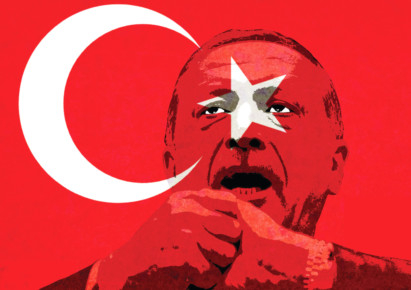
For a few years, Recep Tayyip Erdogan, Turkey’s mercurial prime minister, was on top of the world. In 2011, as regional leaders fell around him like dominoes, his Justice and Development Party (AKP) won a landslide election on a massive turnout. That same year, his visit to post-revolution Egypt was marked by adulatory crowds, many of whom admired Erdogan’s willingness to take on Israel, at least rhetorically, and saw in Turkey a marriage of Islam and democracy that might yield lessons for the countries emerging from the Arab Spring. Regional surveys consistently showed that Turkey’s favourability rating in the Muslim world had soared over the past decade, and that Erdogan was the region’s most popular figure by far. Moreover, he had appeared to vanquish the traditional scourge of Turkish democracy: the coup. Remarkably, over half of Turkey’s admirals and many of its generals languish in jail, many on allegedly trumped-up charges.
Just a couple of months ago, Erdogan was still using this capital to make audacious political moves. In March, he extracted an apology from Benjamin Netanyahu for an Israeli raid on a Turkish aid ship in 2010 that left eight Turks dead. The apology was a symbolic and diplomatic triumph. That same month, he took an even bolder step, and secured a ceasefire with the insurgent Kurdistan Workers’ Party (PKK), laying the groundwork to end a conflict that has bled Turkey for decades. This was strategically astute. In unlocking Kurdish support at home, it was politically even more so: Erdogan’s ultimate goal has been to circumvent term limits by modifying the constitution and taking over a beefed-up presidency, even in the face of resistance from the country’s constitutional commission and his own party.
Long before last week’s violent repression of peaceful protests, the cracks were showing. Turkey’s economic boom and diplomatic activism have obscured the fact that something has gone deeply wrong in the transition from military stewardship to popular democracy. Above all, this is a story of hubris. In a recent interview, Jordan’s King Abdullah recounted telling details of a conversation: “Erdogan once said that democracy, for him, is a bus ride ‘once I get to my stop, I’m getting off’”. The destination is a soft authoritarian one-party state, clothed in democratic garb but shorn of the rights and habits that go with genuine democracy. For example, the state has systematically censored and intimidated journalists — according to some accounts imprisoning the most in the world. Erdogan even threatened to take legal action against a hugely popular Turkish soap opera, Magnificent Century, which depicts the roguish life of Sulaiman the Magnificent, the 16th-century Ottoman sultan. As the protests unfolded, CNN’s Turkish affiliate meekly broadcast a string of comically diversionary shows, including a programme on penguins. This is the hallmark of a cowed press. It is tempting to view the largely middle-class protests that are suddenly spreading across Turkey through the lens of a national culture war: secular versus Islamist, European versus Asian, and urban versus rural. These divisions are real.
The conservative political agenda of the AKP — exemplified by a restrictive new alcohol law that was written and passed with little debate — chafes with many Turks. But this is something both much broader and more inchoate than a secular backlash. As one Turkish columnist put it last year, “the mandate to rule seems to have been interpreted as a blank check to transform the identities and lifestyles of the people”. The proximate cause of the protests — the decision to turn Istanbul’s Gezi Park into a shopping mall — underscores that economic growth can worsen rather than ease these issues, by creating new points of friction.
The underlying problem is simple: Erdogan’s very style of politics. His public address last weekend sounded like a grotesque parody of the standard Arab dictator’s rant to which we have been accustomed. It hit every deranged note, from blaming social media (“there is now a menace which is called Twitter — the worst menace to society”) to sneering dismissal of largely peaceful demonstrators (“a handful of looters”) and, most disturbingly, appeal to force (“don’t compete with us. If you gather 100,000 people, I can gather a million”). These are echoes of Muammar Gaddafi or Bashar Al Assad, not a European Union aspirant. Back to the big picture: Turkey is not Syria, and this is not a Turkish Spring. [Erdogan urged an end to the protests, which is his words, “have lost their democratic credentials and turned into vandalism,” on his return from a trip to North Africa early on Friday. Addressing thousands of his supporters on arrival, he also cautioned them to stay peaceful. Anti-Erdogan protestors however continue to throng Taksim Square as more protests spread across Turkey.]
Turkey’s political opposition is a disorganised mess, and Erdogan could probably win a fresh election. The prime minister is not going to fall, but his personal and political standing have been irreparably damaged, and this will have broader implications for the region. Turkey’s foreign policy, once guided by the principle of “zero problems”, is under manifest strain. Turkish diplomacy with neighbours Iran and Syria has resulted only in frustration and acrimony, and in the latter case might well lead to war.
The Turkish public is wary of Erdogan’s aggressive opposition to the Al Assad regime; many see last month’s car bombing in a border town as evidence that their government’s policy is needlessly provocative. Turkey is bruised both at home and abroad. It is too early to say, but it may eventually emerge from these experiences a more inward-looking, reticent nation. For too long, Turkey has received something of a free ride because of its status as a Nato ally and rising power. It is time that Erdogan is told, in no uncertain terms, that his bus-ride theory of democracy is unsustainable.
— The Telegraph Group Ltd, London, 2013
Shashank Joshi is a research fellow of the Royal United Services Institute in London.










